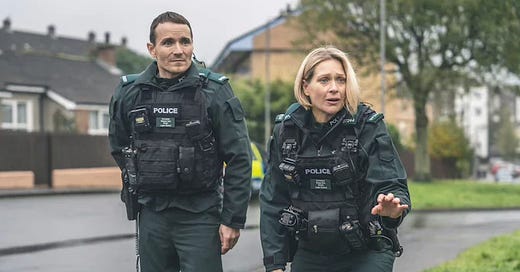**This review contains mild spoilers**
Life in the North is hard to effectively portray on screen. Writers and producers walk a precarious line between conflict cliches that can be donned as quickly and anonymously as a balaclava, and the kind of uncanny valley linguistics of Ted Hastings. When the shaky lens of NI drama focuses in on Loyalist communities things can get even more tricky. This is a community whose life and whose values are seldom sympathetically portrayed in media, and whose own dislocated and (at times) internally conflicted sense of culture is extremely difficult to capture. With the exception of the Billy Plays of the 1980s, Ulster Loyalism seldom finds itself in the role of sympathetically rendered protagonist.
This fact makes the second series of Blue Lights from the BBC all the more daring. Not only is the main action of the season set in a Loyalist estate, but the priorities, fears and pressures of the community it portrays are neither muted nor mitigated for viewer comfort. The Mount Eden Estate is a complicated place which cannot be reduced to the primary colours of a flag and whose social contours are at once tied to the Troubles, and adrift from the ideological ‘certainties’ that might once have bound the community together. The Loyalist godfathers are now old men, the Emperor’s moth-eaten clothes of God and Ulster tattered, and embarrassingly revealing the naked criminality of their activities. The writers Lawn, Patterson and Harris thus impose on themselves the constraints of a world which won’t break down into easy ideology or terrorist aspirations - the residents of Mount Eden are held hostage, not by their past but by its drug dealing ghosts who present an existential threat to them.
Blue Lights succeeds in navigating such choppy cultural waters by the patent humanity of its writing and its cast. The simple binaries of the past are quietly undermined by the stories of ordinary people trying to make their way through 21st century NI culture. Policing is underfunded and ineffective in reaching the hearts and minds of a disaffected and politically disenfranchised community; Lee Thompson pursues a heavily armed altruism which proves that the centre of the Robin Hood story will not hold; grief, loss and forgiveness are showcased within the community and inside the police station - and the world created by the drama breathes with complexity and second-guess uncertainties that seldom have Belfast as their location.
Interspersed among the big stories of drugs, gangs and civic disorder are everyday realities of terminal illness, drug use and domestic abuse, drawn in shades that showcase just how vexed such issues can be for those who face them. The Everyman character of Stevie Neill (brilliantly played by Martin McCann) symbolises the human struggle to process grief and dare to dream of a future at once shaped by and free of the pain of the past; Siân Brooke’s Grace Ellis (brilliant, hesitant, humane) continues to come to terms with place, vocation and the possibility of love. Praise for the cast could fill an entire review, with almost every performance carrying balance, nuance and a refreshing sense of believability. Derek Thompson’s portrayal of Robin Graham (a former RUC Special Branch officer) is remarkable in how effectively it shakes any echo of Casualty’s Charlie, his character oozing silent remorse, institutional disillusion and carefully managed PTSD.
Forgiveness and justice are major motifs in this second season, with no easy answers and a corresponding refusal to damn communities to the perpetuation of violence. The past in NI is portrayed as being influential but not determinative, with two key figures demonstrating that forgiveness of wrongs done, and intercession for a community to reject violence, go some way to providing mediation if not restitution.
Blue Lights gives us a Belfast which is still gritty after all these years, but not graceless - a place which is no longer the backdrop for mere morality plays but a network of communities made up of hard and heroic human stories, where history might just have a slow trajectory towards hope rather than carrying an ever descending cycle of violence.




